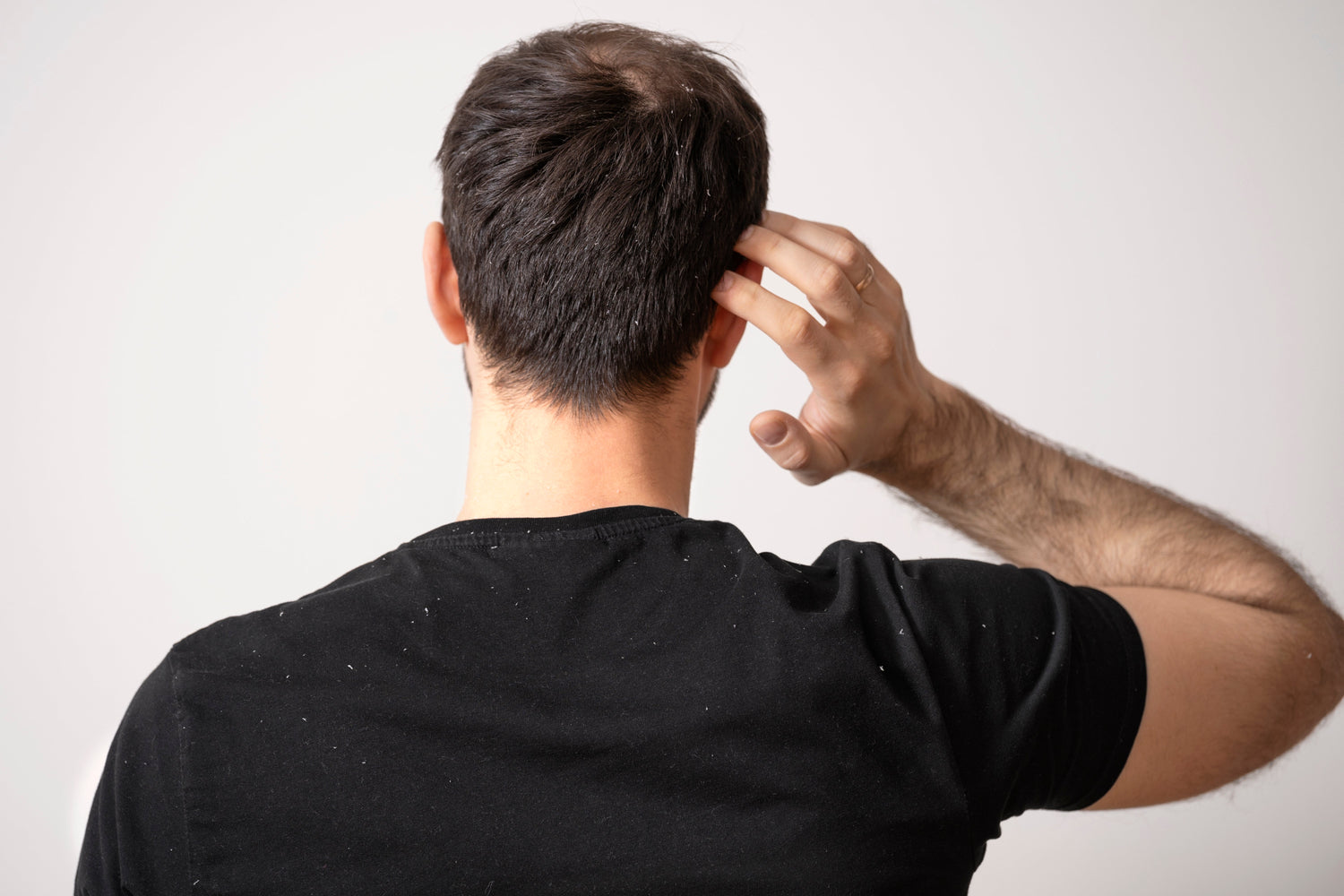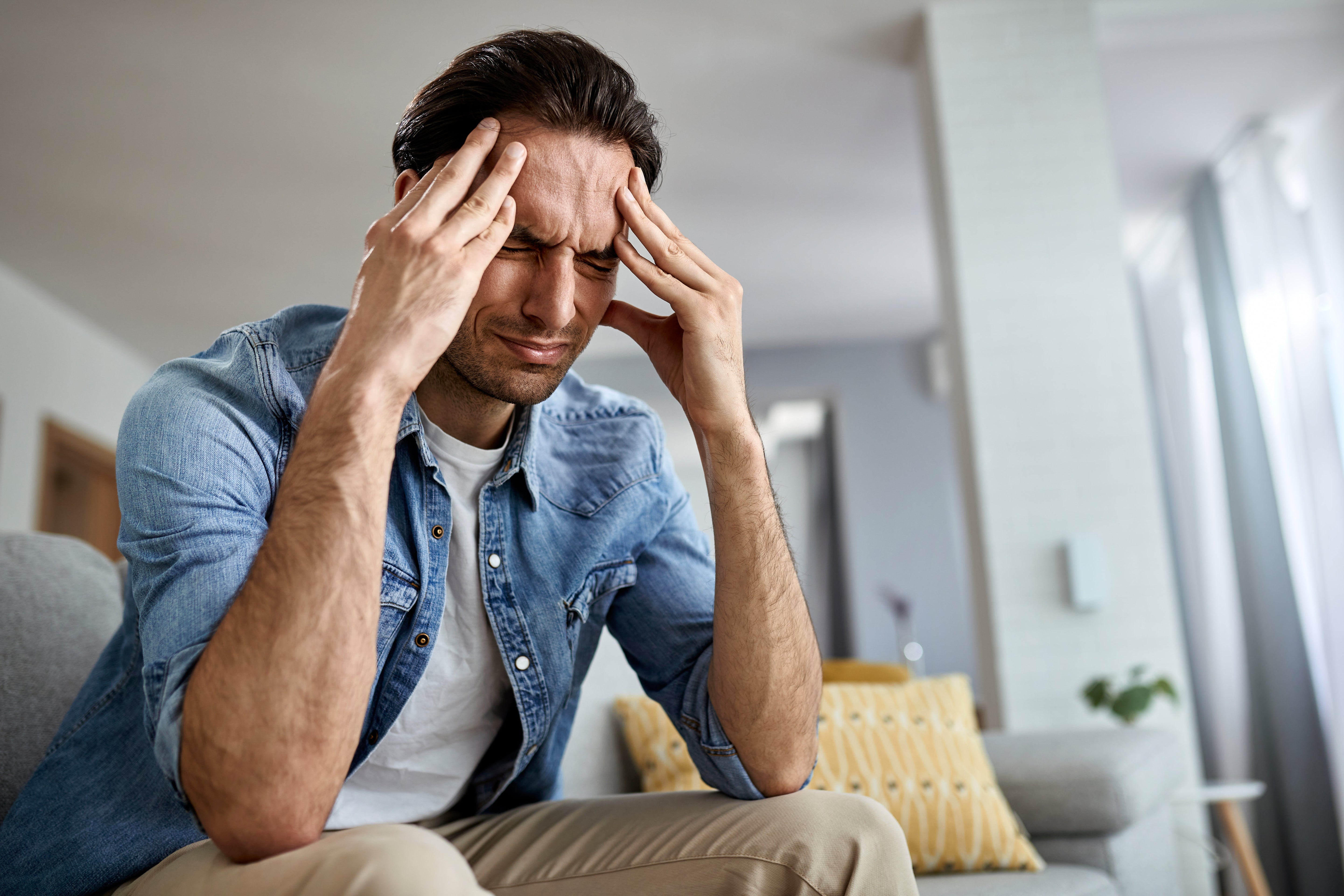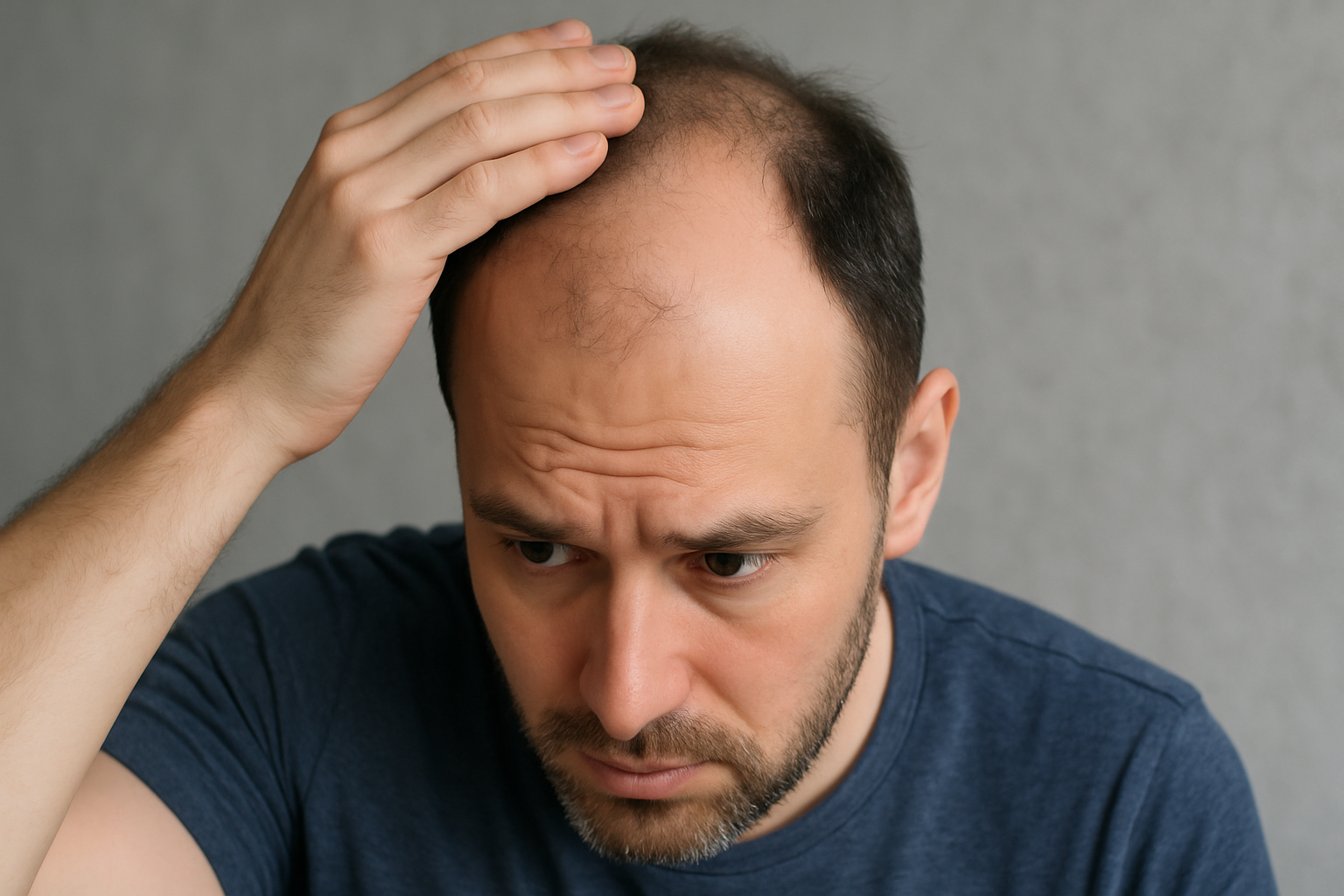Dandruff is a common scalp condition that affects millions of people worldwide. While it may seem like just an itchy inconvenience, many people worry it might lead to something more serious, like hair loss.
But does dandruff actually cause hair loss? And if so, what can be done about it?
This article will walk you through the connection between dandruff and hair loss, help you identify the signs, provide effective treatment tips, and much more.
Understanding Dandruff
According to one report, dandruff affects about 50% of the population. But what exactly is it?
Dandruff is a skin condition that affects the scalp. It causes white or yellow flakes of dead skin to appear in the hair and on the shoulders. Along with flaking, people with dandruff often experience itchiness, dryness, and irritation.
One of the leading causes of dandruff is an overgrowth of a fungus called Malassezia. This yeast-like fungus is naturally found on the scalp, but when it grows too much, it can irritate the skin and lead to more skin cell turnover, which causes flakes.
Another major cause is seborrheic dermatitis, a condition that makes the skin red, greasy, and scaly.
Some other factors that can contribute to dandruff may include:
- Dry skin
- Not shampooing enough
- Sensitivity to hair care products
- Oily skin or hair
- Hormonal changes
- Weather conditions (especially cold and dry weather)
The Link Between Dandruff and Hair Loss
Many people worry that dandruff will make their hair fall out. The truth is, dandruff itself doesn't directly cause hair loss. However, it can lead to behaviors and conditions that may contribute to hair shedding.
For instance, when you scratch your scalp too often or too hard, you can damage your hair follicles. Hair follicles are the tiny pockets in your scalp that grow hair.
If these are hurt, it can weaken the roots of the hair and cause more strands to fall out. Over time, this can lead to noticeable thinning.
In more serious cases, such as seborrheic dermatitis, the scalp becomes inflamed. Inflammation can interrupt the normal cycle of hair growth. When the scalp is unhealthy, it becomes harder for new hair to grow properly.
One study shows that people with dandruff or scalp conditions are more likely to experience higher rates of hair shedding than those with healthy scalps.
However, this doesn't mean they will go bald. It only shows that dandruff can be linked to temporary hair loss or thinning.
Identifying the Signs
Recognizing the early signs of dandruff and hair loss is the first step to managing both conditions effectively. While they're not always directly related, they can sometimes appear together, and knowing what to look for helps you take action before things get worse.
Common Signs of Dandruff
Dandruff is typically easy to spot. The most noticeable sign is white or yellowish flakes that fall from your scalp onto your shoulders or clothes. You might also feel an itchy, irritated scalp, especially after wearing a hat or during dry weather.
In some cases, your scalp may look red, greasy, or scaly, particularly if you have seborrheic dermatitis.
- More hair in your brush or shower drain than usual
- Thinning patches on the crown or temples
- A receding hairline, especially in men
- Wider parts in the hair or reduced volume in ponytails (common in women)
It's important to understand that occasional shedding is normal, especially during seasonal changes or times of stress.
However, if hair fall becomes excessive or is paired with scalp discomfort, it may be time to explore underlying causes, like dandruff or inflammation.
Effective Treatments and Preventive Measures
If you're dealing with dandruff and are worried about hair loss, you're not alone. Many people in the world, including the US, experience it.
Luckily, there are numerous ways, such as store-bought solutions, natural remedies, and lifestyle changes, to tackle dandruff and protect your hair at the same time.
The right solution often depends on how severe your symptoms are and how your scalp reacts to treatment.
That said, here are a few treatments and preventative measures you should consider:
Over-the-Counter Solutions
One easy and effective way to manage dandruff is to start with a medicated shampoo. They are easily available at most drugstores or supermarkets and often work within a few weeks when used consistently.
Make sure to look for shampoos that include the following active ingredients:
- Ketoconazole: This antifungal ingredient fights the overgrowth of Malassezia, the yeast responsible for many dandruff cases. It also helps reduce inflammation on the scalp, which can help prevent hair thinning caused by irritation.
- Zinc Pyrithione: One of the most popular ingredients in dandruff shampoos, it helps fight bacteria and fungus while helping to reduce itching, flaking, and redness.
- Selenium Sulfide: This ingredient slows down skin cell turnover and reduces yeast growth on the scalp. It's especially helpful for oily scalps with visible flakes.
- Coal Tar: Coal tar helps slow down the production of skin cells on the scalp, which can minimize flaking. For people with more severe dandruff or conditions such as seborrheic dermatitis, it can be increasingly useful. However, it can sometimes stain light-colored hair and should be used with caution.
- Salicylic Acid: This helps exfoliate the scalp by removing dead skin cells and flakes. It doesn't have antifungal properties, so it's best when combined with other treatments.
Follow the directions on the bottle, and use the shampoo at least 2–3 times a week, unless advised otherwise. Leave the shampoo on your scalp for about 3 to 5 minutes before rinsing so the active ingredients can work effectively.
You can rotate between different types if your scalp responds better to a combination.
Natural Remedies
If you prefer natural treatments or want to avoid harsh chemicals, home remedies such as essential oils can help soothe your scalp and control flakes. These are especially helpful for mild to moderate dandruff.
Listed below are some ways to get rid of dandruff and hair loss naturally:
- Tea Tree Oil: Known for its antifungal and antibacterial properties, tea tree oil can reduce the yeast that causes dandruff. Blend a few drops with a carrier oil like coconut or jojoba oil and massage it into your scalp. Leave it on for 15–30 minutes before rinsing.
- Aloe Vera: Aloe vera is great for calming itchy and inflamed skin. You can apply fresh aloe vera gel directly to your scalp and leave it on for 30 minutes before washing your hair.
- Apple Cider Vinegar: ACV may help balance the scalp's pH and reduce yeast overgrowth. Mix equal parts water and ACV, and use it as a rinse after shampooing.
- Coconut Oil: With moisturizing and antimicrobial properties, coconut oil can help reduce dryness and fight fungi. Use it as a scalp mask once or twice a week.
- Rosemary and Lavender Oil: These essential oils can improve scalp circulation and reduce irritation. One study found that rosemary oil may help prevent hair loss. Before using, ensure to dilute them with a carrier oil.
Lifestyle Modifications
Sometimes, dandruff isn't just about what you put on your scalp, it's also about how you live your life.
Here are a few simple lifestyle changes that can make a big difference in your scalp and hair health:
- Wash Your Hair Regularly: Keeping your scalp clean helps remove excess oil and dead skin cells. If your scalp is oily, washing every other day may help reduce buildup.
- Avoid Harsh Products: Hair gels, sprays, and dyes that contain alcohol or sulfates can dry out your scalp and make dandruff worse. Look for gentler, sulfate-free hair products.
- Manage Stress: Believe it or not, stress can trigger or worsen dandruff. Try stress-reducing practices like yoga, exercise, meditation, or even just going for a walk outdoors.
- Eat a Balanced Diet: What you eat affects your skin, including your scalp. Make sure your diet includes vitamin B (especially B2, B7, and B12), zinc, omega-3 fatty acids, and protein. These nutrients help promote healthy skin, reduce inflammation, and support hair growth.
- Stay Hydrated: Drink enough water every day to keep your skin, including your scalp, properly moisturized.
- Protect Your Scalp: If you're exposed to a lot of sun or dry air, wear a hat or scarf to prevent your scalp from drying out and becoming more irritated.
When to Seek Professional Help
Even if you've tried all of the above, there may come a time when you need professional help. You should see a dermatologist if your dandruff:
- Doesn't improve after a month of regular treatment
- Becomes more severe or painful
- Is accompanied by oozing, crusting, or hair loss in patches
You might be dealing with something more complex, like psoriasis, eczema, or a scalp infection that needs prescription medication.
A dermatologist can give you stronger treatments, such as prescription shampoos or creams, and make sure there isn't a more serious underlying problem.
Introducing Spartan's Hair Care Solutions
If you seek a targeted way to manage dandruff and support hair growth, consider Spartan's range of hair care products. These products are specially formulated with natural ingredients such as:
- Tea tree oil for dandruff control
- Biotin and caffeine for boosting hair strength
- Aloe vera and chamomile for soothing the scalp
Spartan's mission is to create clean, science-backed solutions for people dealing with dandruff, thinning hair, or both.
Many users have reported positive results with Spartan products. For instance:
- Not only does it make my hair smell great, but I've also seen noticeable changes in my hair density. – Michael Lawson
- I have been using the product for almost 2 months, and I can see that my hair has stopped falling. – Osama Ahmed.
Conclusion
So, does dandruff cause hair loss? While dandruff doesn't directly cause permanent hair loss, it can create an unhealthy scalp environment that leads to hair shedding if left untreated.
Fortunately, there are various effective treatments, from medicated shampoos to natural oils and lifestyle changes. If nothing seems to work, don't hesitate to consult a dermatologist for expert care.
And if you're looking for a proven, natural-based solution, Spartan's hair care products might be just what your scalp needs. Don't wait for things to get worse, take action today.



